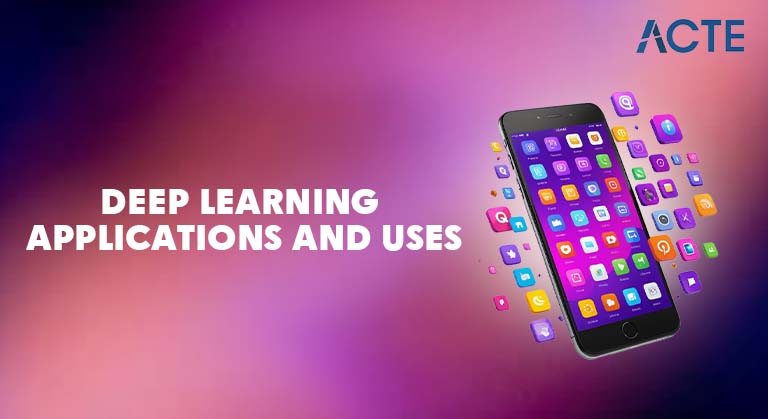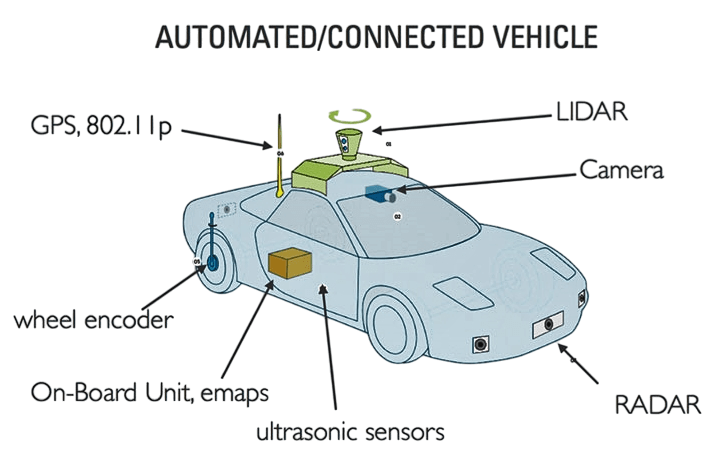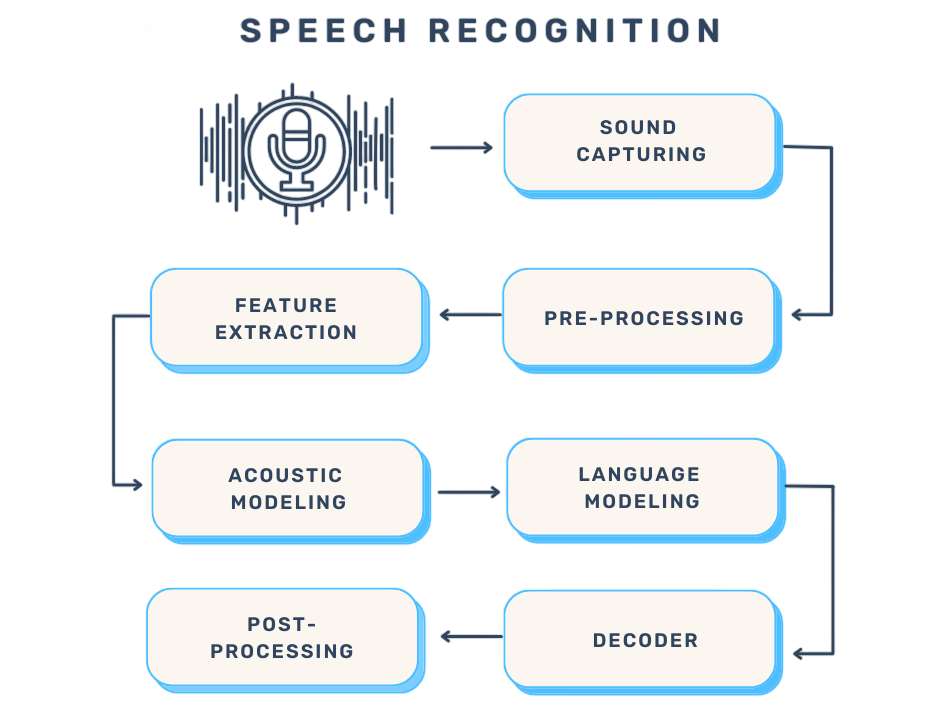
- Image Recognition
- Natural Language Processing
- Autonomous Vehicles
- Healthcare and Diagnostics
- Finance and Fraud Detection
- Chatbots and Virtual Assistants
- Gaming and Augmented Reality
- Predictive Analytics
- Recommendation Systems
- Speech Recognition & Robotics
- Conclusion
Image Recognition
Artificial Intelligence (AI) has evolved from a futuristic idea to a practical technology integrated into everyday life. From recognizing images on social media to driving autonomous cars and making financial predictions, AI powers a wide array of Deep Learning Applications. These applications leverage various subfields of AI including machine learning (ML), deep learning, natural language processing (NLP), and computer vision. This guide explores major domains where AI is having a transformative impact. Machine Learning Training provides the foundational knowledge needed to navigate these domains and build intelligent systems across industries. Image recognition is a significant technology that allows computers to see and classify digital images with great precision. By using deep learning and convolutional neural networks, this advanced technology imitates how humans perceive visuals in various fields. Its uses cover important areas, such as employing facial recognition for surveillance and authentication, spotting serious issues like tumors in medical images, streamlining defect detection in quality control for manufacturing, and improving visual search in retail. Tools like OpenCV, TensorFlow, PyTorch, and Amazon Rekognition support these complex processes, changing how machines understand and interpret visual information with unmatched accuracy and efficiency.
Ready to Get Certified in Machine Learning? Explore the Program Now Machine Learning Online Training Offered By ACTE Right Now!
Natural Language Processing (NLP)
Natural Language Processing (NLP) has changed how machines understand, interpret, and generate human language. It supports new technologies in various fields. Platforms like Google Translate and DeepL allow smooth language translation. Brands use detailed sentiment analysis to track customer feedback. Tools like ChatGPT and BERT use NLP to process large amounts of text and provide clear information powered by foundational concepts like What Is Machine Learning, which enables systems to learn from data and improve predictions without explicit programming. They also offer innovative features like text summarization and question-answering. Additionally, NLP improves accessibility with speech-to-text and text-to-speech systems. Ongoing progress in transformer-based models and large language models (LLMs) makes machine communication feel more natural, context-aware, and subtle. As these technologies progress, NLP helps close the communication gap between humans and machines, leading to more advanced and user-friendly interactions.
Autonomous Vehicles
AI powers self-driving vehicles by integrating computer vision, sensor fusion, and deep reinforcement learning.
Core Technologies:
- Perception: Cameras, LiDAR, and radar help detect lanes, pedestrians, and other vehicles.
- Decision-making: Algorithms determine safe driving strategies.
- Control systems: Convert decisions into real-time vehicle movements.

Industry Impact:
Companies like Tesla, Waymo, and Cruise are pioneers in the space. These systems aim to reduce human error, increase road safety, and enhance mobility for the elderly and disabled. Challenges include edge case handling (e.g., unusual traffic scenarios), regulatory concerns, and public trust.
To Explore Machine Learning in Depth, Check Out Our Comprehensive Machine Learning Online Training To Gain Insights From Our Experts!
Healthcare and Diagnostics
AI is revolutionizing healthcare by offering tools that assist doctors, optimize patient care, and improve diagnostics often powered by models like the Support Vector Machine (SVM) Algorithm, which excels at classification tasks by identifying optimal decision boundaries between medical categories.
Major Deep Learning Applications:
- Medical imaging analysis: Tools like Aidoc and Zebra Medical help in early disease detection.
- Predictive analytics: AI forecasts disease progression or hospital readmissions using patient history.
- Drug discovery: AI accelerates molecule screening, reducing R&D time and cost.
- Personalized treatment: ML models recommend treatments based on patient data and genomics.
AI has also been crucial in pandemic response, helping in contact tracing, resource allocation, and outbreak modeling.
Finance and Fraud Detection
Artificial Intelligence has changed the financial sector by enabling smart data analysis and new operational capabilities. By using machine learning algorithms, financial institutions can now detect fraudulent activities with great accuracy, assess credit risks in more detail, and carry out high-frequency trading strategies in real-time. AI-powered chatbots have also improved customer service experiences by providing instant support and account help. Leading companies like Mastercard and PayPal are already using these technologies, saving millions each year through smarter fraud detection and prevention systems. Machine Learning Training equips professionals to design and deploy such intelligent systems, driving efficiency and security at scale. The use of AI in finance marks a significant shift. It offers valuable insights by analyzing large amounts of financial data and revealing complex patterns and anomalies that old methods could not find. This technological change is not just improving efficiency but is also transforming how financial institutions manage risk, interact with customers, and make machine learning strategic decisions.
Chatbots and Virtual Assistants
AI-driven conversational agents are changing customer service and productivity in many areas. These smart systems, like chatbots such as Intercom and Drift, handle common customer questions efficiently. This frees up human agents to tackle more complex tasks. In addition to customer support, voice assistants like Siri, Alexa, and Google Assistant have become essential in everyday life often enhanced by interpretable models like Decision Trees in Machine Learning, which simplify decision-making through hierarchical feature splits and clear outcome paths. They help with tasks, offer personalized suggestions, and control smart home devices. Notably, platforms like Woebot provide emotional support through user-friendly conversations, highlighting AI’s role in mental health assistance. Advanced natural language processing (NLP) helps these AI agents understand context, emotion, and intent. This leads to more human-like interactions that blend efficiency with empathy.
Looking to Master Machine Learning? Discover the Machine Learning Expert Masters Program Training Course Available at ACTE Now!
Gaming and Augmented Reality (AR)
AI brings realism and adaptability to gaming and AR, creating immersive and personalized experiences driven by Pattern Recognition and Machine Learning, which enable systems to detect trends, classify behaviors, and respond intelligently to user interactions.
Deep Learning Applications in Gaming:
- Non-playable characters (NPCs): AI makes NPCs smarter, more reactive, and lifelike.
- Game testing and design: Automated testing ensures smoother gameplay, while AI generates levels and environments.
- Player behavior modeling: Helps in tailoring difficulty and offering dynamic storylines.
- AI + AR: Enables real-time object recognition and interactive overlays. For example, IKEA Place uses AR to let customers visualize furniture in their homes.
AI makes gaming more engaging by adjusting itself to the user’s playing style and preferences.
Predictive Analytics
AI’s ability to detect trends and predict outcomes empowers organizations to make proactive decisions.
Industries Leveraging Predictive Analytics:
- Retail: Demand forecasting, inventory management, and churn prediction.
- Healthcare: Predicting disease onset or treatment response.
- Finance: Credit default prediction and market trend analysis.
- Manufacturing: Predictive maintenance to minimize downtime.
AI models analyze historical and real-time data to forecast likely scenarios, optimizing resource allocation and minimizing risk.
Preparing for Machine Learning Job Interviews? Have a Look at Our Blog on Machine Learning Interview Questions and Answers To Ace Your Interview!
Recommendation Systems
Recommendation engines personalize user experiences by suggesting relevant items based on behavior, preferences, and context often built using deep learning frameworks like Keras vs TensorFlow, which differ in abstraction level, flexibility, and integration with backend systems.
Common Use Cases:
- E-commerce: Amazon recommends products based on purchase history.
- Streaming platforms: Netflix and Spotify suggest movies or songs based on viewing/listening patterns.
- News and content: Google News and Flipboard personalize article feeds.
- Collaborative filtering, content-based filtering, and hybrid models trained on user-item interaction matrices.
Such systems enhance engagement, improve sales, and drive user retention.
Speech Recognition & Robotics
Voice and speech recognition technologies have changed how we interact with machines. They convert spoken language into text and recognize individual speakers. These systems have many uses, including transcription services like Otter.ai and Rev, voice-controlled devices such as smart assistants and IoT Deep Learning Applications, and accessibility tools that help users with physical or visual impairments all powered by Machine Learning Tools that enable scalable automation, speech recognition, and adaptive user interfaces. Companies are also using voice biometrics as a strong security measure in banking and business settings. Recent progress in deep learning and transformer models like Whisper and wav2vec has significantly improved precision and understanding, allowing developers to create more refined speech recognition features.

At the same time, AI-driven robotics has changed how tasks are carried out in various areas, showing great independence and flexibility. Industrial robots now handle complex repetitive tasks like welding and assembly. Service robots effectively clean and deliver items in hospitals and hotels. In medicine, surgical robots improve accuracy in minimally invasive procedures, while exploration robots boost human abilities in tough environments like space and deep-sea missions. Artificial intelligence strengthens these robotic systems with better path planning, object detection, and real-time decision-making skills.
Conclusion
Artificial Intelligence is no longer a niche technological innovation, it’s a foundational element of digital transformation across industries. From analyzing images and understanding speech to driving cars and predicting financial trends, AI is pushing boundaries and unlocking new capabilities. Machine Learning Training enables professionals to harness these capabilities, turning complex data into actionable intelligence. As adoption continues to grow, its ethical implementation and responsible development will become increasingly important. Whether you’re a developer, researcher, entrepreneur, or student, understanding these AI applications can help you harness its power for innovation and societal good.



